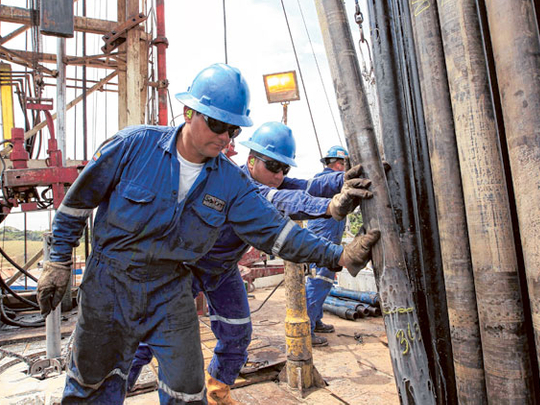
Benchmark oil prices were in single digits the last time I attended a lecture on the subject at Chatham House, the world-renowned policy institute in London.
That was in 1998, and the prime motivation for the assembly then was to consider the potentially dire consequences on Saudi Arabia of barrels of crude selling at a paltry $8 (Dh29) a time.
A far cry, then, from the world today. Political stability in the Kingdom would appear to be much as it was, whereas we all know that Brent and the related series produced by the Gulf are now maintaining triple-digit levels.
So when Opec Secretary-General Al Badri addressed his audience at the same venue last week, both very little (politically) and very much (in the oil market) had changed — and discounting nominal prices for inflation could not remotely account for the difference. The Middle East and North Africa Energy 2013 conference heard a firmly delivered message.
Whereas the threat of “peak oil” had come and gone, and the important market impact from the development of shale gas in the US was acknowledged, in an interdependent world “fossil fuels will remain central to the world’s energy mix for the coming decades”, he adjudged.
However, rather than taking comfort from that prospect, the Secretary-General sounded a certain alarm about the shorter- or medium-term potential for falling prices, and their impact on producing countries, both in terms of their income and their decisions to invest in future capacity.
Fair return
This warning was condensed to the exhortation: “stability, stability, stability”. Namely, for producers “to earn a fair return from the exploitation of their exhaustible natural resources”, for the consuming economies “so that they may grow”, and for investment, such as by the Gulf, so the sector would “flourish”.
Strangely enough, a quick glance at recent price trends would not imply any concern, with prices historically high but market volatility per se low and even subsiding.
The US’s Energy Information Administration (EIA) highlighted recently how monthly trading ranges had declined through 2012 (see chart), and indeed continued in the same vein through January.
The subtext, however, was clear enough in Al Badri’s speech. He referred to market fear of prices dropping, and to the role of speculation as a driving force, including indeed in support of the rising prices seen earlier last year, despite the market being “well-balanced”.
While accepting that oil-exporting countries need to diversify, he sought recognition that they also need petroleum receipts sufficient to support their continued economic and social development.
Oil importers
Lest that appear to be too one-sided a viewpoint, he moreover made the comparison with the position of oil-importers. Over the 2007-11 period “Opec member countries received close to $4.2 trillion in revenues from crude oil sales. But OECD countries received over $5.5 trillion from oil taxes”, he observed. Trade and its implications are a two-way street, no doubt.
The precise relevance of this equation to the GCC countries was detected by the IMF in a recent paper. Studying the impact of oil price volatility on the region’s budgetary condition, it found that “the impact of a drop in the oil price would be larger than the impact of an increase of equal magnitude, with a one-in-six probability of turning a healthy fiscal surplus into a fiscal deficit as early as 2013”.
The Secretary-General would be acutely aware of this susceptibility and its ramifications, and his appeal for awareness in such a forum was therefore well-placed.
In the matter of “safeguarding all our interests”, as he put it, the shifting sands of the oil market should not disguise the geopolitical as well as economic pressures in a turbulent and somewhat fragile world.











